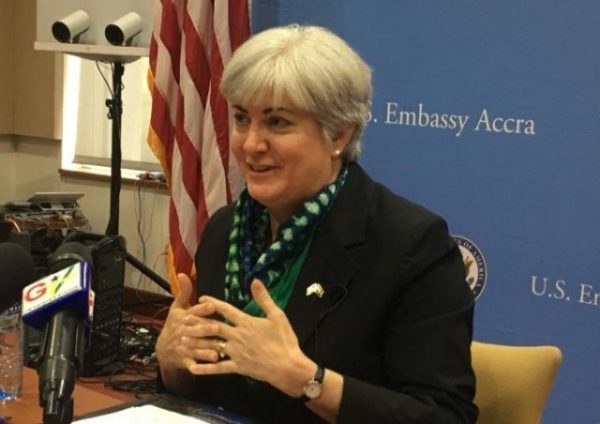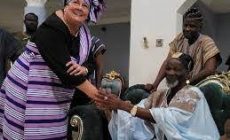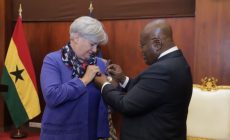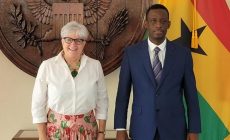US won’t escalate visa restrictions on Ghanaians — Ambassador
- Posted on
- Comment
 The United States government has taken a decision not to escalate the visa restrictions it imposed on certain categories of Ghanaians in February this year.
The United States government has taken a decision not to escalate the visa restrictions it imposed on certain categories of Ghanaians in February this year.
The decision is the result of fruitful discussions between the two governments in an attempt to find an amicable solution to the deportation of some 7,000 Ghanaians residing illegally in the United States (US).
The US Ambassador to Ghana, Ms Stephanie Sullivan, who disclosed this in an interview in Accra last Friday, however, did not say when the limited restrictions would be lifted, except to express the hope that by the end of the year there might be a complete resolution of the matter.
Meanwhile, the move to de-escalate the visa restrictions to other categories of Ghanaians is expected to get many Ghanaians heave sighs of relief.
Background
The US imposed visa restrictions on Ghana for refusing to accept the return of 7,000 Ghanaians that the US wanted to deport.
The US Embassy in Accra limited the granting of visas to certain applicants, such as the domestic staff of diplomats posted to the US and other public servants who draw their salaries from the state.
It threatened that the sanctions would be expanded to include other categories of people if the issue was not resolved.
The US accuses the 7,000 would-be deportees of immigration offences, including abusing the terms of their visas.
“Ghana has failed to live up to its obligations under international law to accept the return of its nationals ordered removed from the United States,” the US Secretary of Homeland Security, Kirstjen Nielsen, said in a statement.
Ghana had questioned the deportees’ nationality and treatment and explained that the process was delayed so that officials could vet the deportees and confirm their nationalities.
But last September Ghana’s Ambassador to the US, Dr Baffour Adjei-Bawuah, said an agreement had been reached to return the deportees.
The thorny issues
It is widely believed that many of the deportees carrying Ghanaian passports are not true Ghanaian citizens but other nationalities who, through dubious means, have been able to lay hands on Ghanaian passports.
The situation raises many questions about the lapses in acquiring Ghanaian passports which make it possible for non-Ghanaians to access the travel document they do not qualify to hold.
This has brought to the fore the need for the government to take extra stringent measures to ensure that officials at the Passport Office do not compromise their offices to issue Ghanaian passports to non-Ghanaians.
Progress so far
Ms Sullivan said the governments of the two countries had held a series of meetings which were likely to result in an amicable solution to the impasse which was creating some discomfort for those affected because of the frequency at which they had to go through the process of obtaining visas to travel to the US, either for official duties or otherwise.
Explaining further what the real issues were, she said: “Those affected are people living in the US illegally, having been identified by immigration and gone through the courts and exhausted all the processes thereof.”
According to her, the embassy had a job to do in verifying the citizenship of those who claimed to be American.
Ms Sullivan said per the international convention on civil aviation, of which Ghana was a signatory, there was a standard issuance time of 30 days, so when those documents were not issued in 30 days or drag on beyond that, it created a lot of financial and other headaches for the US side.
“So we are working very closely with Accra and Washington to develop a reputable and sustainable process for issuing these timely travel documents,” she said.
“We have a clear way forward; it’s a matter of implementing that way forward by issuing these travel documents and after that we will be in a position to review the consequences, not just in Accra but with the restrictions that may apply to Ghanaian visa applicants,” the US Ambassador added.
-Graphic










 (Selorm) |
(Selorm) |  (Nana Kwesi)
(Nana Kwesi)